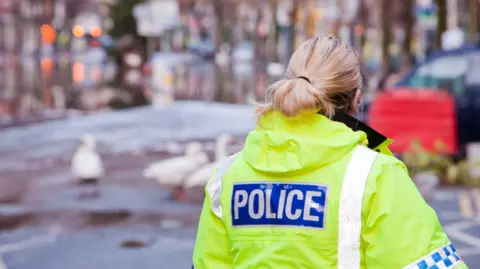Starmer: 3,000 more police to be hired by March 2026
 Getty Images
Getty ImagesPolice forces will recruit 3,000 extra neighbourhood officers and community support officers (PCSOs) over the next 12 months, the prime minister has announced.
Sir Keir Starmer said he wanted to end the policing "postcode lottery" by ensuring every community had dedicated teams of officers focused on patrolling town centres at peak times in England and Wales
The PM also announced a "summer crime blitz" where police will patrol town centres targeting shoplifters, pickpockets, phone thieves and those who assault shop workers.
The Labour government is aiming to put named local officers into each neighbourhood and boost police ranks by 13,000 by 2029.
The 3,000 new neighbourhood officers will include 2,500 police officers and nearly 400 PCSOs.
On a visit to Huntingdon in Cambridgeshire, Sir Keir said visible policing has fallen dramatically in recent years, with 90% of crime left unsolved, and announced £200m will be spent on hiring police in areas including Derbyshire, Yorkshire, Cambridgeshire and Somerset.
"We've got to end this culture of crime that is destroying our communities," he said.
"Today I can announce the first step - 3,000 new neighbour officers, being onboarded by the start of next year.
"All of them visible, on the beat and serving their communities – not stuck behind a desk or taken away to plug shortages elsewhere.
With a million anti-social behaviour reports last year, Sir Keir also announced a £66m investment in a "summer crime blitz", where police patrols will target antisocial behaviour in town centres.
But police forces across the country are facing severe financial challenges, with some warning of cuts to existing officers this year.
Last year, the National Police Chiefs' Council said forces faced an estimated gap of £1.3bn in their overall finances over the next two years.
In January, the Home Office announced an extra £100m for neighbourhood policing in England and Wales.
Conservative shadow home secretary Chris Philp said Labour must give the police the resources they need and linked potential job cuts to the rise in employer national insurance contributions.
"Thanks to Labour's jobs tax, our police services face a £118 million shortfall, putting over 1,800 police jobs at risk," Philp said.
Speaking on BBC Breakfast, Home Secretary Yvette Cooper defended Labour's investment in the police.
“Overall, we’re investing more than a billion extra in policing across the country this year compared to last year, and that applies right across the country," she said.
"The police forces have all had additional funding to cover issues like National Insurance, but also to cover pay increases and the important need to support policing right across the country.”
Labour made recruiting an extra 13,000 officers into neighbourhood roles one of its central pledges ahead of last year's general election.
The government's plan for neighbourhood policing involves patrols in "hotspot" areas during the busiest periods, such as on Friday and Saturday nights.
An anti-social behaviour lead in every force will be expected to develop tailored action plans with residents and businesses.
Police forces have operational independence and discretion over when they send officers out on patrol.
One government source said it would be up to forces to decide when peak time is.
The Liberal Democrats said "the proof will be in the delivery of this announcement".
"The government must fix this fully by properly funding the officers our communities need - not passing the buck to local police chiefs to put up people's council tax instead," the party's home affairs spokesperson Lisa Smart said.
A Reform UK spokesman said the party wanted to see "officers spending their time doing real work".
The spokesman said forces had wasted "millions in employing diversity and inclusion staff instead of focusing on frontline policing".
Green Party MP Sian Berry said community police officers were dealing with a "flood of work" after "cuts to other vital frontline services".
She said: "The danger here is that we set these officers up to fail by not addressing the devastating impact of austerity on youth services specifically that are so much better placed to work with young people than the police."

Sign up for our Politics Essential newsletter to keep up with the inner workings of Westminster and beyond.
